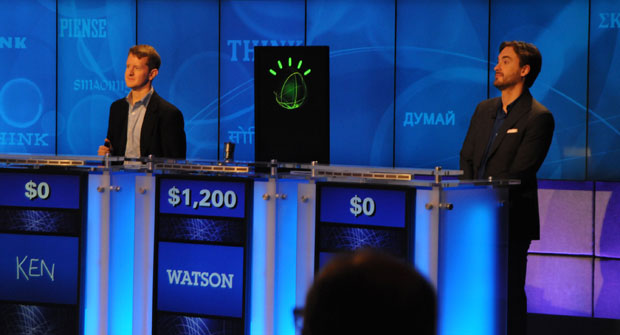It proved that it could beat the best Jeopardy! champions in the world at their own game. Now, IBM’s Watson will try to help doctors make better medical decisions for their patients.
WellPoint, Inc. and IBM announced an agreement today to develop and launch Watson-based medical solutions. It will be the first commercial applications of the IBM Watson technology. The program, which is scheduled to roll out next year, will begin by assisting nurses who manage complex patient cases. It will help the insurer to review treatment requests from medical providers.
Stage two will put the technology out in the field to a limited number of oncology practices. There, the system’s ability to process 200 million pages of data in three seconds will allow doctors to ask questions, input symptoms, and compare reactions to treatments to streamline the process. The goal is to improve quality of care with cost-savings as the natural byproduct.
“There are breathtaking advances in medical science and clinical knowledge, however; this clinical information is not always used in the care of patients,” said Sam Nussbaum, M.D., WellPoint’s Chief Medical Officer. “Imagine having the ability to take in all the information around a patient’s medical care — symptoms, findings, patient interviews and diagnostic studies. Then, imagine using Watson analytic capabilities to consider all of the prior cases, the state-of-the-art clinical knowledge in the medical literature and clinical best practices to help a physician advance a diagnosis and guide a course of treatment.
“We believe this will be an invaluable resource for our partnering physicians and will dramatically enhance the quality and effectiveness of medical care they deliver to our members.”
Despite its Jeopardy win, there were occasional snafus (such as answering “What is Toronto?????” when the Final Jeopardy category was U.S. Cities) during the 3-day event that acted as a reminder of the limitations of computers, even the “smartest” ones. While there is definitely excitement about having a system that could sift through the wealth of data out there that humans are incapable of processing, any improper medical decisions made by the computer will be highlighted and scrutinized.
“I would want to make sure Watson was being directed as an objective tool,” said John Glaspy, oncologist at the UCLA.
We will see in a few months. The program is set to start in early 2012. Hopefully, it won’t make medical mistakes the way it made this geography mistake:


that actually looks like a lot of fun dude. Wow.
anonymize.it.tc
excellent article! thanks for point this out… watson is one smart pc
Hope it really makes no mistake.